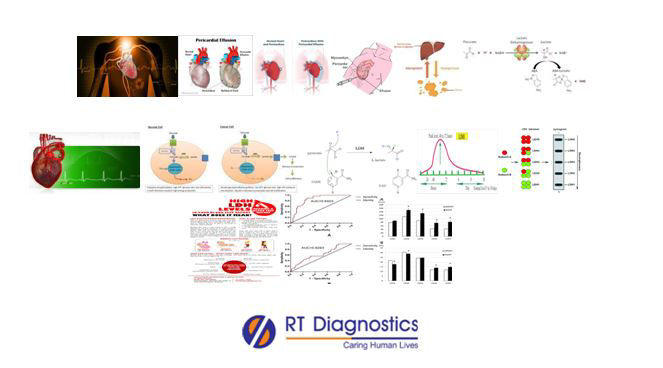LDH- Pericardial Fluid:
Why Pericardial Fluid Test ?
CLINICAL INFORMATION
In General, the enzymes within the cell (cytosol) are impermeable to cell membranes (hence these cellular enzymes cannot enter blood circulation easily) and thus these enzyme activities are very low compared to those within the cell. LDH is also known as ‘lactate dehydrogenase’. This enzyme catalyses the conversion of lactate to pyruvate. LDH is present in almost every cell in the body- including blood (serum and/or plasma), muscles, brain (CSF sample specimen collected by lumbar puncture also known as a spinal tap), kidneys, liver, lung (eg. empyema), pancreas etc. “Iso-Enzymes” are the multiple forms of the same enzyme that differ in physical properties but they have the same function (similar catalytic activity) eg- they bind to the same substrates (or in other words - They are different variants of the same enzyme having identical functions). Iso-enzymes are of utmost clinical interest since they can be used as molecular markers of tissue damage. The iso-forms of LDH are LDH-1: present in the heart, brain and RBCs, LDH-2: present in the RES – Reticulo-Endothelial System, LDH-3: present in the lungs, LDH-4: present in the kidney, placenta and the pancreas, LDH-5: present in the liver, striated muscles and the brain. LDH test measures the amount of LDH enzyme present in the blood and/or other body fluids. Hence this test looks for signs of damage to the body tissues (eg. Myocardial infarction) and also to know the extent of injury in case of heart, liver, kidney diseases etc. This test is a helpful tool in conditions like hemolytic and/or megaloblastic anaemia, prognosis in cancer treatment etc. The sample specimen is usually an intra-vascular fluid eg. Blood (serum/plasma) and/or body or bio-fluids. High levels of LDH are found in certain pathological conditions such as anaemia, liver diseases, muscle injury, kidney diseases, heart attack (myocardial infarction), pancreatitis, infections like infectious mononucleosis, and encephalitis, meningitis, certain cancer types including leukaemia, lymphoma etc. Additional tests include the Troponin-1 (the diagnosis of infarction has been largely superseded by this test) test. Supporting tests include other serum levels of skeletal muscle enzymes or proteins that serve as markers in pathological conditions eg. Creatine kinase (CK), aldolase, myoglobin, troponin, aspartate aminotransferase, and carbonic anhydrase CAIII. But in physiological conditions too for example in strenuous exercises – muscle injury mediated by apoptosis may occur triggered by increased oxidative stress and hence other markers may serve as an important tool like thiobarbituric acid- reactive substances, malondialdehyde, sulfhydryl groups, reduced glutathione, oxidized glutathione, super-oxide dismutase, catalase etc. Other tests include ESR, D-dimer, CRP, enzymatic assays or colorimetric, HPLC, spectrophotometry etc.
PERICARDIAL fluid analysis is used to help diagnose the cause that leads to the accumulation of fluid in the pericardium, (for differential diagnosis - either exudate or transudate) i.e. if the cause is due to inflammation of the pericardium (pericarditis), or fluid accumulation due to non-inflammatory causes (i.e) If the cause of fluid accumulation around the heart is due to an imbalance of pressure within blood vessels etc. Hence this differential diagnosis would enable to confirm the cause of pericardial fluid accumulation and also for prognosis (effective treatment). Hence LDH pericardial fluid test is performed to screen to detect the underlying pathology in the heart.

General Instructions:
Sample Requirement: Specimen – Pericardial Fluid. Test Preparation: None.
NOTE - Sample for specimen collections may vary based on the patient’s condition/cases according to the patient’s presenting complaints/signs or symptoms:
SPECIMEN REQUIREMENT (Special or Rare Cases) - As instructed and guided by Physician / Clinician / Pathologist / as per Laboratory’s requirements, according to procedures and protocols.
This Multi-Specialty Clinical Referral Laboratory RT DIAGNOSTICS provides precise and accurate tests with an extensive range of testing services to the medical centres to help in the diagnosis and identification of pathology in the test specimens for infectious diseases and also to evaluate the function of organ systems of the patient. It prevents further complications and helps to stabilize and restore health to near normalcy at the earliest without delay.



